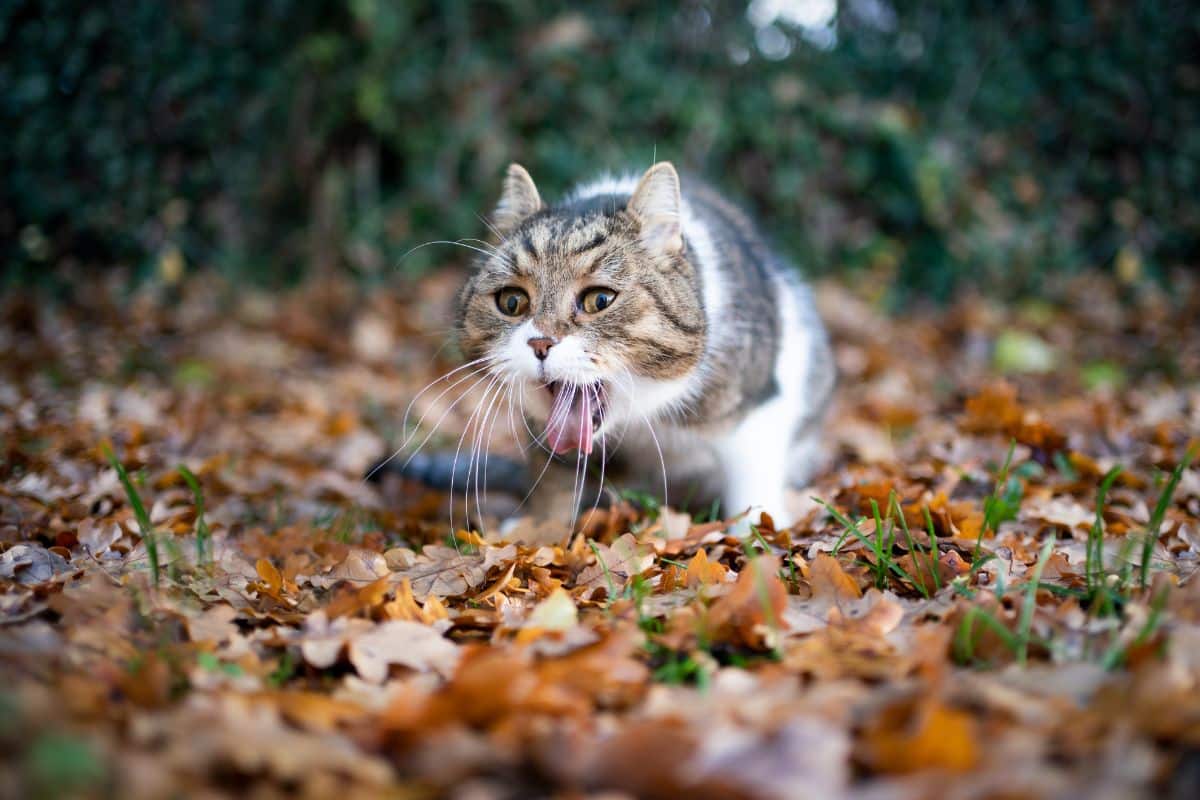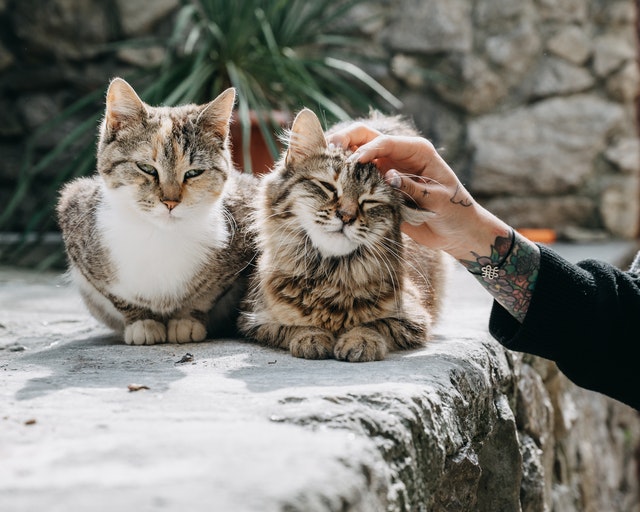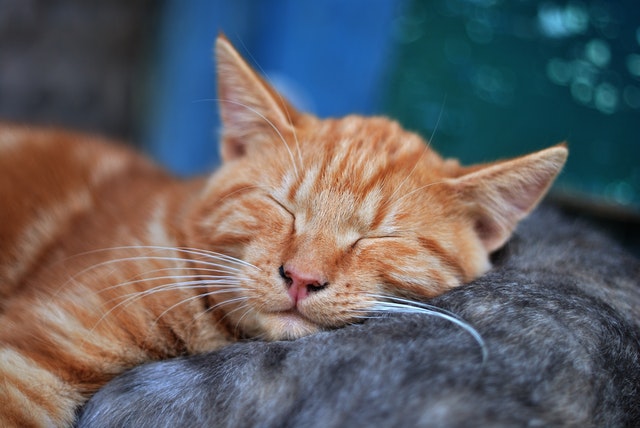There are several reasons why cats vomit. It is wise to remember that even the healthiest pet feline may vomit once in a while. Most often, this is nothing to really worry about. If your cat does have issues and is vomiting more than one time a week, you would be wise to take the cat to the veterinarian.

When a cat begins to vomit shortly after it has eaten, more than once a day, once a week there is likely an issue that needs to be remedied. If the same cat seems to be gagging much more often, or seems to be lazy and does not want to get up, call the vet and get an emergency appointment.
Causes
One of the most common reasons that a cat will vomit is due to a hairball. This hairball is an undigested clump of hair that is long and round. Basically the size of the cat’s throat. This hairball is wet, and soaked with bile, and digestive liquids. Many cats do cough up hairballs once a week, maybe every other week. This is not an instance that needs concern.
Another possible cause for a cat that is vomiting is the possibility of eating a houseplant that it should not have. Granted, the human should not have a dangerous plant in the house with a cat present. Many seemingly common houseplants are ones that cats should not eat. You will find if given the option, cats and dogs alike will chew on grass and some plants.
The cat may have managed to find some human food that they should not be eating, chocolates or onions, maybe they found a piece of string. Anything that is laying on the floor could be dangerous for your feline. They are curious animals and will grab anything they could into their mouths. This may be paper clips, rubber bands or even a broken balloon. All of these objects will hurt the cat.
Then there are the causes that mandate medical attention for the cat as quickly as can be made. These will include:
- Internal Parasites
- Constipation
- Irritable Bowel Disease
- Obstruction due to a foreign object
- Tumors
- Diabetes
- Kidney Disease
- Hyperthyroidism
In order for the veterinarian to diagnose the exact issue afflicting your cat, they are going to need a complete history of your cat. The office will then perform a physical examination, urine test and a test on the fecal matter. Those tests will inform the Veterinarian if there is a parasite, a metabolic disorder or if the cat has some type of toxin that has been ingested.
If all those tests come back as normal, then an X-Ray will be taken and an ultrasound performed. These two will show if there is a forieng object inside, or if there are growths that need further testing. If those two appear to be normal, then a biopsy will be done from the intestine, which will help to determine if there is a cancerous mass or digestive issue such as Inflammatory bowel disease.
There is one issue that many do not think could be the cause of vomiting in your cat. Hairballs, or furballs. When a cat does their grooming, they are working to remove the loose hairs and also the dirt. When there is too much hair within the throat and stomach area, the cat will regurgitate. The cat is likely able to remove the hairball the first try. However, there may be a time or two when the hairball does not dislodge so easily.
This in turn, will cause the cat to have some distress and likely begin to vomit. The sight they leave will not be a very pleasant one, but what is important in this issue is that the cat is alright and able to bounce back to being himself. If, after seemingly removing the hairball, the cat still continues to gag, or heavy drooling is occurring it is time to see the veterinarian. The issue could be too large of a hairball that the cat is unable to regurgitate.
If the cat is allowed to venture outdoors for a time during the day, it is also possible that your friendly little feline was not so friendly to the mouse it saw running. It is a natural instinct for cats to hunt down prey. Many times, they bring the prey to you as a present. There are times though that your cat will begin to eat the mouse or rodent it has captured. This will likely cause some stomach discomfort. The cat will likely vomit a few times.
If you know where the cat usually sits when outdoors, you may be able to spot the victim, this could be the answer. If, however, you do not see a sign of a rodent or bird, call and speak with the veterinarian. They may tell you to watch the cat for a period of time. Of course, if the cat is continuously vomiting, take the cat to the animal hospital quickly. There could be a bone lodged in the throat causing all the issue.
Treatment

If there is an infection or a parasite, antibiotics or other medication will be given. All cases of prolonged vomiting in the cat need to be dealt with in the best way possible. The cat can be kept over a period of time so that it can be given IV fluids. They will watch to see if there is further vomiting. The veterinarian will possibly give the cat a medicine that will help it to stop vomiting. This is called an antiemetic medicine.
Antibiotics, deworming, an endoscope used to remove a foriegn object in the throat, all these can be done relatively easily. Other foriegn objects lodged further down will need to be removed surgically. If there is a cancerous mass or tumor, options will be discussed in regards to chemotherapy and/or surgery. Inflammatory Bowel Disease can be treated with antibiotics, steroids and dietary therapy.
Periodic Vomiting
If your cat is vomiting shortly after it eats, this could be caused by eating too fast. Avoid feeding the cat for at least twelve hours and watch the cat. You should give the cat a couple of tablespoons of water often, and watch what happens. If the vomiting ceases in the first twelve hours, you can give the cat food again. However, feed slowly, only a portion of his food at first.
This will give his stomach a chance to recuperate. A little food is better than none or too much. Some animals, cats included, do tend to eat much faster than their body can deal with. This could be the cause of the vomiting.
Continuous Vomiting
If your cat is experiencing vomiting more than once or twice, if you notice blood in the vomit, if your feline friend becomes lethargic, is in obvious pain or there is blood in the feces or urine. Immediate attention should be sought.
The Veterinarian may ask you to bring the vomit, or some of it with you. This may help him or her to understand what is affecting the furry little one.
Diagnosis

By examining the vomit, your veterinarian may be able to determine a cause. Due to the vomit, the veterinarian may be able to notice a few different issues:
- If there is too much mucus within the vomit, this could be a sign of an inflamed intestine.
- Undigested food may tell him there is poison, or that your cat has eaten too much or too quickly.
- If there is bile in the vomit, this could indicate an issue with the pancreas or Inflammatory Bowel Disease
- If the veterinarian spots red blood in the vomit, it could be a sign that the stomach has become ulcerated.
- If there is an overly strong odor, this could indicate that there is a blockage or intestinal obstruction.
So while it may sound and be disgusting to pick up the vomit and place it in a baggie, the cat may need you to do this to ultimately save his or her life. In reality, determining if your cat is vomiting or regurgitating is important. Regurgitation is when food is expelled before it even reaches the stomach. Vomiting is what happens when the food has reached the stomach and begins to break down.
If you notice that your cat is drooling, swallowing excessively, licking the lips or hiding away from you, this is the time to watch him or her closely. Episodes when the cat vomits once or twice in a 24 hour time frame, is considered occasional and should not be stressed about. Especially if the cat is normally a healthy feline.
Always be sure to have routine visits with the veterinarian. By keeping routine medical and dental visits, the veterinarian will be able to tell when something is happening medically with your cat. The history is on file, all records are on file and this would help to save some time when it is an emergency.




